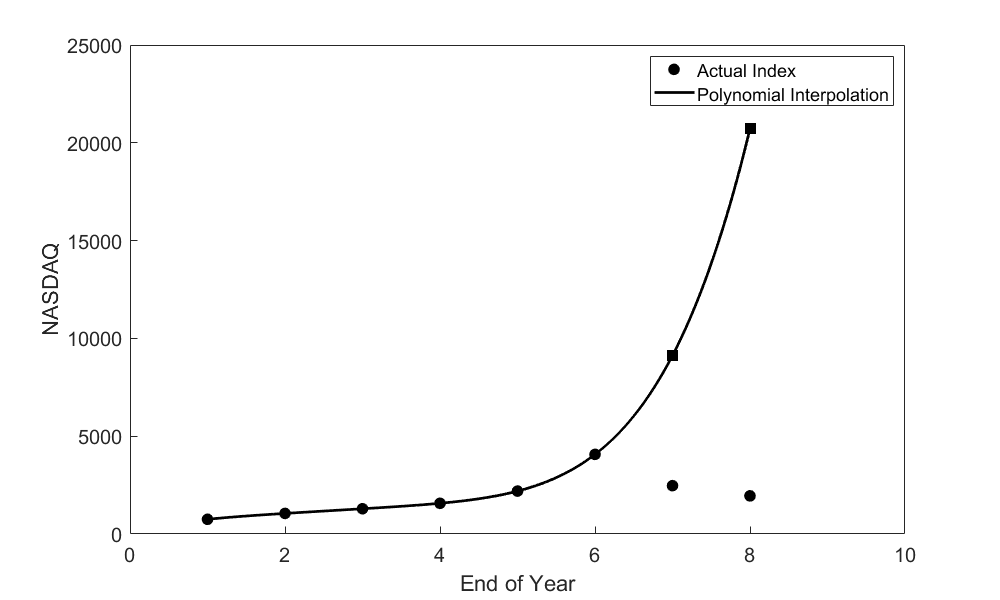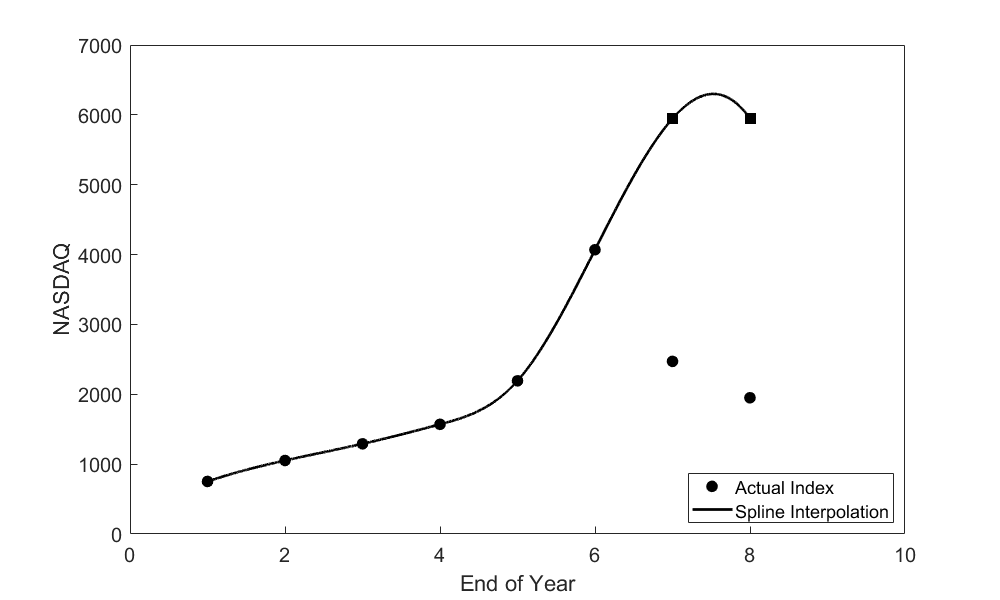Chapter 05.06: Extrapolation is a Bad Idea
Learning Objectives
After successful completion of this lesson, you should be able to:
1) enumerate why using extrapolation can be a bad idea.
2) show through an example why extrapolation can be a bad idea.
Description
This conversation illustrates the pitfall of using extrapolation.
(Due to certain reasons, this student wishes to remain anonymous.)
This takes place in Summer Session B – July 2001
Student: “Hey, Dr. Kaw! Look at this cool new cell phone I just got!”
Kaw: “That’s nice. It better not ring in my class or it’s mine.”
Student: “What would you think about getting stock in this company?”
Kaw: “What company is that?”
Student: “WorldCom! They’re the world’s leading global data and internet company.”
Kaw: “So?”
Student: “They’ve just closed the deal today to merge with Intermedia Communications, based right here in Tampa!”
Kaw: “Yeah, and …?”
Student: “The stock’s booming! It’s at $14.11 per share and promised to go only one way—up! We’ll be millionaires if we invest now!”
Kaw: “You might not want to assume their stock will keep rising … besides, I’m skeptical of their success. I don’t want you putting yourself in financial ‘jeopardy!’ over some silly extrapolation. Take a look at these NASDAQ composite numbers (Table 1).”
Student: “That’s only up to two years ago …”
Kaw: “That’s right. Looking at this data, don’t you think you should’ve invested back then?”
Student: “Well, didn’t the composite drop after that?”
Kaw: “Right again, but look what you would’ve hoped for if you had depended on that trend continuing (Figure 1).”
Student: “So you’re saying that …?”
Kaw: “You should seldom depend on extrapolation as a source of approximation! Just take a look at how wrong you would have been (Table 2).”
Table 1. End of year NASDAQ composite data
| End of year | NASDAQ |
|---|---|
| \(1\) | \(751.96\) |
| \(2\) | \(1052.13\) |
| \(3\) | \(1291.03\) |
| \(4\) | \(1570.35\) |
| \(5\) | \(2192.69\) |
| \(6\) | \(4069.31\) |
Note: The range of years in Table 1 are actually between 1994 (Year 1) and 1999 (Year 9). Numbers start from 1 to avoid round-off errors and near singularities in matrix calculations.

Figure 1 Data from 1994 to 1999 extrapolated to yield results for 2000 and 2001 using polynomial extrapolation.
Table 2 Absolute relative true error of polynomial interpolation.
| End of Year | Actual | Fifth order polynomial interpolation |
Absolute relative true error |
|---|---|---|---|
| \(2000\) | \(2471\) | \(9128\) | \(269.47 \%\) |
| \(2001\) | \(1950\) | \(20720\) | \(962.36 \%\) |
Student: “Now wait a sec! I wouldn’t have been quite that wrong. What if I had used cubic splines instead of a fifth-order interpolant?”
Kaw: “Let’s find out.”

Figure 2 Data from 1994 to 1999 extrapolated to yield results for 2000 and 2001 using cubic spline interpolation.
Table 3 Absolute relative true error of cubic spline interpolation
| End of Year | Actual | Cubic spline interpolation |
Absolute relative true error |
|---|---|---|---|
| \(2000\) | \(2471\) | \(5945.9\) | \(140.63 \%\) |
| \(2001\) | \(1950\) | \(5947.4\) | \(204.99 \%\) |
Student: “There you go. That didn’t take so long (Figure 2 and Table 3).”
Kaw: “Well, let’s think about what this data means. If you had gone ahead and invested, thinking your projected yield would follow the spline, you would have only been 205% (Table 3) wrong, as opposed to being 962% (Table 2) wrong by following the polynomial. That’s not so bad, is it?”
Student: “Okay, you’ve got a point. Maybe I’ll hold off on being an investor and just use the cell phone.”
Kaw: “You’ve got a point, too—you’re brighter than you look … that is if you turn off the phone before coming to class.”
* * * * *
<One year later … July 2002>
Student: “Hey, Dr. Kaw! Whatcha got for me today?”
Kaw: “The Computational Methods students just took their interpolation test today, so here you go. <hands stack of tests to student> Time to grade them!”
Student: <Grunt!> “That’s a lot of paper! Boy, interpolation … learned that a while ago.”
Kaw: “You haven’t forgotten my lesson to you about not extrapolating, have you?”
Student: “Of course not! Haven’t you seen the news? WorldCom just closed down 93% from 83¢ on June 25 to 6¢ per share! They’ve had to recalculate their earnings, so your skepticism really must’ve spread. Did you have an”in” on what was going on?”
Kaw: “Oh, of course not. I’m just an ignorant numerical methods professor.”